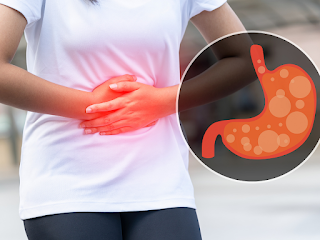Bloating is one of the most common forms of digestive problems. Although benign, they can however be quite troublesome.
But fortunately, bloating is also very easy to treat, once the cause is determined. Thus, we present you with the common reasons behind your stomach bloating.
What are the causes of bloating?
If you are ever struggling with stomach bloating, here are the 7 main causes that could be causing your discomfort.
Intestinal growth of yeast
Food intolerance
Sensitivity to gluten or celiac disease
Insulin resistance
Bad combination of food
Irregular meals
Deficiency of digestive enzymes (including lactose intolerance)
How to stop bloating?
1. Intestinal growth of yeast:
When there is too much yeast in the body, you will necessarily have bloating. This is because yeasts ferment food, producing gas. Some people also have cravings for sugar or very high carbohydrates, a tendency to binge eating, brain fog, fatigue, vaginal yeast infections and possibly fungal skin infections.
The good news is that it can be treated by rebalancing your intestinal flora with a yeast cleaner. For that, adopt a low sugar diet and restore your intestinal flora with probiotics.
2. Food intolerance:
Food intolerance may be suspected in a person with a history of allergies, eczema, asthma, or a family history of autoimmune disease, but may also be associated with many other skin conditions and digestive disorders.
The most common food intolerances are dairy products, eggs, some fruits (banana, citrus, especially pineapple), sometimes nuts (almonds and peanuts are the most common), wheat, gluten, corn or other . Usually, bloating will improve within 4 to 6 weeks after the elimination of aggravating foods.
3. Sensitivity to gluten or celiac disease:
If you suspect that gluten may be a problem for you, a starting point is to do appropriate blood tests to confirm, or to start a strict 5 week gluten-free trial.
After 5 weeks of gluten-free feeding, it is important to reintroduce it into your diet to clarify your reaction. There are so many good alternatives to gluten: rice, quinoa, millet, squash and sweet potato to name a few.
4. Insulin resistance:
Blood tests can confirm insulin resistance. The good news is that this condition is treatable and reversible with changes in diet and exercise.
The key is to reduce your intake of sugar and carbohydrate foods, with a focus on more vegetables, protein, fiber and healthy fats. In addition, start exercising regularly.
5. Bad combination of foods:
Did you know that the types of foods you eat together can affect the way they are digested? The biggest rule of dietary combination is to eat your fruits
alone, and not to combine them with other foods, especially proteins.
6. Irregular meals:
Our bodies work best with balanced, regular meals, and our digestive system also works best with consistency. Have breakfast in the hour after waking up, lunch at noon and dinner before 19 hours. You can however include snacks mid-morning and mid-afternoon if necessary.
7. Digestive enzyme deficiency:
Digestive enzymes are produced by the pancreas to help break down food into forms that can be absorbed by your body. Enzymes break down proteins, carbohydrates, fats and lactose. In some cases, the body may not produce enough digestive enzymes, resulting in bloating, pain, indigestion, and irregular bowel movements.
A temporary solution to this problem is to take digestive enzymes with your meals, and avoid dairy products if you have lactose intolerances. It is important, however, to get to the root of the problem and address imbalances to encourage the body to produce enough enzymes on its own.
